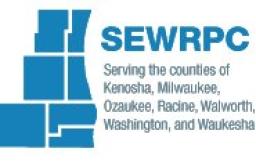

@ Milwaukee County Zoo Zoofari Conference Center 10001 W...
Attendees: @Kurt
Southeastern Wisconsin REGIONAL PLANNING COMMISSION
1607 ·WAUKESHA. WI 53187-1607·
TELEPHONE (262) 547-6721
FAX (262) 547-1103
Serving the Counties of: KENOSHA MEMORANDUM MILWAUKEE OZAUKEE RACINE WALWORTH WASHINGTON WAUKESHA Agencies and Individuals within Southeastern Wisconsin with an Interest in Transit Services for Seniors, People with Disabilities, and Low-Income Populations
Kenneth R. Yunker, Executive Director, Southeastern Wisconsin Regional Planning Commission
October 26, 2016
Meeting for the Coordination of Human Services Transportation and Transit Strategies for Seniors, People with Disabilities, and Low-Income Populations in Southeastern Wisconsin The Southeastern Wisconsin Regional Planning Commission (SEWRPC) is currently updating the Public Transit-Human Services Coordination Plans for each of the seven counties in Southeastern Wisconsin that were last developed in 2012.
As part of the update, you are invited to participate in a meeting to establish eligibility for select Federal transit funding programs and assist in the coordination of human services transportation and transit strategies for seniors, people with disabilities, and low-income populations in Southeastern Wisconsin:
Tuesday, November 29, 2016
9:30 a.m. -3:30 p.m.
Milwaukee County Zoo
Zoofari Conference Center
10001 W Blue Mound Road
Milwaukee, WI 53226
This meeting will examine the transportation services (public, private, and non-profit) that serve these specific population groups (seniors, people with disabilities, and low-income), and participants will work to identify strategies to improve transportation options for those groups. This coordinated planning process is required in order for public transit operators, units of government, and non-profit organizations to be eligible for the following Federal and state funds to implement the identified strategies: • The Enhanced Mobility of Seniors and Individuals with Disabilities Program (Section 5310 Program) provides funding through the Federal Transit Administration (FT A) to assist public
-2-transit operators, units of government, and non-profit organizations with enhancing mobility for seniors and people with disabilities. This program includes traditional projects such as capital expenses for the purchase of specialized transit vehicles used to serve seniors and people with disabilities as well as non-traditional projects that were previously authorized under the Section 5317 New Freedom Program such as mobility management, non-vehicle capital, and operating expenses for transportation projects that exceed the requirements of the Americans with Disabilities Act of 1990 (ADA), improve access to fixed route transit service and decrease reliance by people with disabilities on complementary paratransit, and provide alternatives to public transportation that assist seniors and people with disabilities. • The Wisconsin Employment Transportation Assistance Program (WET AP) represents an effort to connect low-income workers with jobs through enhanced local transportation services. WETAP integrates Federal, state, and local funding into a single program and is administered jointly by the Wisconsin Department of Transportation and the state Department of Workforce Development. The goal of this program is for local areas to work together in a collaborative process to assess the transportation needs for low-income workers and develop options for addressing those needs. Agencies that intend to apply--or who have applied-for funding from one of these programs are strongly encouraged to attend. Please see the preliminary meeting agenda that is included with this invitation Jetter. At the meeting, Commission staff will present data and maps illustrating current public, private, and non-profit transit services and the transportation needs of seniors, people with disabilities, and low-income population groups. Participants will then assess how well the existing services meet the needs, identify potential strategies to address those needs, and discuss how to implement the proposed strategies. We are sending invitations to elected officials and representatives from public and private transit providers, human services agencies, job centers, and advocacy groups; however, we may not have included everyone who may be interested. Please share this invitation and agenda with other agencies or individuals who may want to participate, particularly residents who use these services or could be served by potential service expansions.
Please inform the Commission staff if you or someone from your organization will be attending the meeting by calling Joe Delmagori at 262-547-6721, or e-mailing jdelmagori@sewrpc.org.
We ask that persons with special needs contact the Commission staff at least three days in advance of the meeting so appropriate arrangements can be made.
KRY/KJM/CTH/JMD #234543 Enclosure
AGENDA
PUBLIC TRANSIT-HUMAN SERVICES TRANSPORTATION COORDINATION PLANNING MEETING
DATE: Tuesday, November 29, 2016
TIME: 9:30 a.m. -3:30 p.m.
PLACE: Milwaukee County Zoo -Zoofari Conference Center
10001 W. Blue Mound Road
Milwaukee, WI 53226
AGENDA:
9:30 -9:40 a.m.
9:40-10:00 a.m.
10:00 -10:30 a.m.
10:30 -11 :30 a.m.
Introductions.
Overview of the coordination planning process.
WisDOT staff presentation on funding programs and opportunities.
Breakout groups on regional discussion topics. In this session, participants should discuss issues with existing services, identifying unmet needs for services across county lines and strategies for addressing them.*
11:30 a.m. -12:30 p.m. Discussion of results from breakout groups and developing an implementation plan.*
12:30 - 1 :00 p.m.
1 :00 -3:15 p.m.
3:15 -3:30 p.m. Lunch (provided).
Breakout groups by county, for discussion of travel within each county. This will include a discussion of progress on the 2012 coordination plans, identifying continuing and new unmet needs, and developing strategies and an implementation plan.*
Overview of next steps and adjournment.
*These sessions may be shorter or longer, depending on the amount of discussion.
KRY/KJM/CTH/JMD #234538
